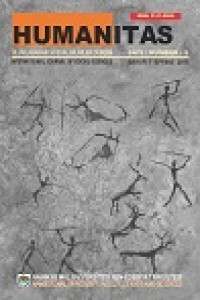Öz
In the Early Turkish Republican period, Reşat Enis Aygen was one of the most influential representatives of socialist realism and naturalist literature, outlined by Maxim Gorki. Aygen’s works represent the struggle for life of the poor and oppressed class with a keen observation in the way that Emile Zola and Orhan Kemal do in their works. In his novel Afrodit Buhurdanında Bir Kadın, (1937) which is described as a cornerstone of Turkish Literature by Nazım Hikmet, Aygen depicts the hardships that a working Anatolian woman faces, such as sexual assault. Aygen is in a struggle to convey conditions of the working class through his realistic view with a naturalist approach. Reflecting social structure of the period and oppressive system of exploitation and dominant worldview, Aygen strikingly conveys his novel by bearing witness to his time. His novel mirrors the period at the hands of his fictional character Yıldız, who has been brought up by her uncle as an orphan. Although there is some incompleteness as far as the artistic fiction is concerned in the novel, it is a noteworthy work in terms of reflecting the working conditions of the period. In this study, it is aimed to analyse Afrodit Buhurdanında Bir Kadın by Marxist fiction/novel sociology approach, which is called Genetic Structuralism by Lucien Goldmann. Composed of comprehension and explanation, this approach analyses the text with a structuralist view while it articulates the historical and social aspects
Anahtar Kelimeler
Öz
Uyumsuz tiyatro akımının öncü yazarlarından Eugène Ionesco, oyunlarında varoluşun anlamsızlığını ve insanın kendisini gerçekleştiremeyişini grotesk ve simgesel bir anlatımla açımlar. Ionesco, yazınsal yaşamında önemli bir dönüm noktası olan Gergedanlar adlı oyununda, İkinci Dünya Savaşı öncesinde başlayan totaliter yönetimlerin, insanlığı yavaş yavaş ele geçirmesini irdeler. Yazar, gerçeküstü anlayışla yazdığı oyununda yaşamın anlamını ve bilinçaltını sorgular. Totaliter yönetimde yaşayan insanların, baskılara dayanamayarak sürü haline geldiklerini ve özgür iradelerini başkalarına teslim etmelerinin trajik sonuçlarını vurgular. Oyun, Nazizm süresince insanoğlunun yaşadığı barbarlığa karşı bir çığlık gibidir. Usdışı bir imge olarak algılanan gergedanlaşma, birbirlerine benzeme isteği sonucunda başkalaşan çoğunluğun kişiliklerini yitirmeleri ve daha güçlü bir hale gelerek diğer insanları ezme düşüncesine dayanır. Ionesco, büyük yankılar uyandıran oyunu aracılığıyla insanın sıkışmışlığını ortaya koyar. Toplumun sürü kimliğine bürünmesini ve hegemonik güç haline gelen her şeyi eleştirir. Zamana uyma kaygısındaki insanın yaşam karşısındaki çaresizliğine, yalnızlığına, umutsuzluğuna, korkularına ve düş kırıklıklarına odaklanır. Ionesco, insanoğlunu temel sorunları ile yüzleştirdiği oyununda, Fransızların Alman işgali altındayken şiddete karşı koymamalarının yergisini yapar. Her tür bağnazlığa ve zorbalığa karşı çıkan yazar, insanoğlunun otoriteye teslim olmadan, özgür iradesini kullanarak yazgısını belirlemesinin önemini vurgular. Baskı ve şiddete karşı başkaldıran insanın, koşulsuz bir sevgi ile onurundan vazgeçmemesi gerektiğini dile getirir. Çalışmamızda, başkalaşım yoluyla gergedanlaşan bir toplumun ilkelerini yadsıma olgusu, metne bağlı inceleme yöntemi ışığında çözümlenmeye çalışılacaktır.
Anahtar Sözcükler: Eugène Ionesco, Gergedanlar, 20. Yüzyıl, Uyumsuz Tiyatro.
THE BATTLE OF THE INDIVIDUAL AGAINST THE MASSES IN THE PLAY OF EUGÈNE IONESCO CALLED RHINOCEROSES
Abstract: One of the pioneer writers of the absurd theatre stream, Eugène Ionesco, describes the meaninglessness of existence and the failure of mankind in realizing himself by means of a grotesque and symbolic depiction. Eugène Ionesco exhibits the gradual capture of mankind by totalitarian regimes, which gained power prior to the Second World War, in his famous play Rhinoceroses, which is an important mile stone in his literary life. The writer questions the meaning of life and subconsciousness in his play, which he wrote in a surrealistic approach. He emphasizes the fact that people, who lived under a totalitarian regime, began to form a herd by being unable to resist continuous political pressure anymore and tragic consequences of the fact that they delivered their free will over to others. The play seems to be like a scream against barbarism that humanity had suffered from during the Nazi regime. Becoming a rhinoceros, which is perceived as an irrational image, is based upon the loss of identity of the transforming majority due to the willingness to resemble one another and to oppress other people by becoming a stronger entity. Ionesco demonstrates the situation, in which mankind is caught in between, by means of his play, which yielded a tremendous echo in its context. He criticizes the fact that society endorsed a gregarious identity and everything that turned into a hegemonical power. He focuses on hopelessness, loneliness, desperateness, fear and disappointment of mankind, who is anxious about adapting oneself to time with respect to life. Eugène Ionesco makes use of irony and satire of the lack of resistance in France to violence whilst being under German occupation, in his play through which he confronts people with their basic problems. The author, who opposes all kinds of fanaticism and despotism, underlines the importance for mankind to determine their destiny by exerting their own free will, without surrender to any authority. He states that people, who revolt against oppression and violence, should never give up on their unconditional love and honour. By means of a text-based methodology, we try, in this study, to analyse the denial of principles of a society that turns into a crowd full of rhinoceroses as a result of metamorphosis.
Keywords: Eugène Ionesco, Rhinoceroses, 20th Century, the Theatre of the Absurd.
Anahtar Kelimeler
Ayrıntılar
| Birincil Dil | Fransızca |
|---|---|
| Bölüm | Tüm Sayı |
| Yazarlar | |
| Yayımlanma Tarihi | 14 Nisan 2015 |
| Yayımlandığı Sayı | Yıl 2015 Cilt: 3 Sayı: 5 |









